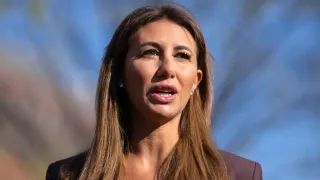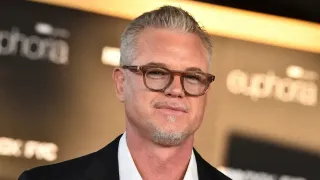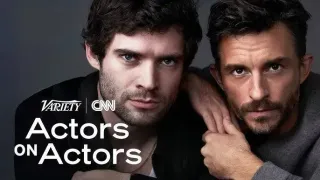May 3
Noteworthy and Influential People Who've Died this Year
Bernard McGhee READ TIME: 12 MIN.
The month of April saw the death of history's first Latin American pope.
Known for his embrace of the downtrodden, Pope Francis, who died of a stroke, signaled a different tone for the papacy, stressing humility over hubris. His funeral was attended by presidents and princes who came from around the world to pay their final respects.
The month also saw the death of actor Val Kilmer, whose numerous roles included playing a fan-favorite character in "Top Gun" and portraying musician Jim Morrison in "The Doors." The intensity Kilmer brought to his roles also gave him a reputation of being hard to work with.
Other notable death in April include basketball Hall of Famer Dick Barnett, "Dennis the Menace" star Jay North, former Malaysian Prime Minister Abdullah Ahmad Badawi, Peruvian author Mario Vargas Llosa, Blondie drummer Clem Burke and football player Steve McMichael.
Here is a roll call of some influential figures who have died in the first four months of this year (cause of death cited, if available):
January
Wayne Osmond, 73. A singer, guitarist and founding member of the million-album-selling family act The Osmonds, who were known for such 1970s teen hits as "One Bad Apple," "Yo-Yo" and "Down By the Lazy River." Jan. 1.
David Lodge, 89. A witty and prolific British novelist and critic who gently satirized academia, religion and even his own loss of hearing in such highly praised narratives as the Booker Prize finalists "Small World" and "Nice Work." Jan. 1.
Rosita Missoni, 93. The matriarch of the iconic Italian fashion house that made colorful zigzag-patterned knitwear high fashion and helped launch Italian ready-to-wear. Jan. 1.
James Arthur Ray, 67. A self-help guru whose multimillion-dollar business toppled after he led a sweat lodge ceremony in Arizona that left three people dead. Jan. 3.
Costas Simitis, 88. A former prime minister of Greece and the architect of the country's joining the common European currency, the euro. Jan. 5.
Jean-Marie Le Pen, 96. The founder of France's far-right National Front was known for fiery rhetoric against immigration and multiculturalism that earned him staunch supporters and widespread condemnation. Jan. 7.
Peter Yarrow, 86. The singer-songwriter best known as one-third of Peter, Paul and Mary, the folk music trio whose impassioned harmonies transfixed millions as they lifted their voices in favor of civil rights and against war. Jan. 7.
Nancy Leftenant-Colon, 104. The first Black woman to join the U.S. Army Nurse Corps after the military was desegregated in the 1940s. Jan. 8.
Sam Moore, 89. The surviving half and higher voice of the 1960s duo Sam & Dave, which was known for such definitive hits of the era as "Soul Man" and "Hold On, I'm Comin.'" Jan. 10.
José "Cha Cha" Jiménez, 76. A prominent Civil Rights figure in Chicago who advocated for Puerto Rican rights, founded the Young Lords and co-founded the Rainbow Coalition. Jan. 10.
David Lynch, 78. The filmmaker celebrated for his uniquely dark and dreamlike vision in such movies as "Blue Velvet" and "Mulholland Drive," and the TV series "Twin Peaks." Jan. 16.
Bob Uecker, 90. He parlayed a forgettable playing career into a punch line for movie and TV appearances as "Mr. Baseball" and a Hall of Fame broadcasting tenure. Jan. 16.
Joan Plowright, 95. An award-winning British actor who, with her late husband Laurence Olivier, did much to revitalize the U.K.'s theatrical scene in the decades after World War II. Jan. 16.
Cecile Richards, 67. A national leader for abortion access and women's rights who led Planned Parenthood for 12 tumultuous years. Jan. 20.
Mauricio Funes, 65. A president of El Salvador who spent the final years of his life in Nicaragua to avoid various criminal sentences. Jan. 21.
Valérie André, 102. A French aviator and parachutist who became the first woman to become a general officer in France. Jan. 21.
Garth Hudson, 87. The Band's virtuoso keyboardist and all-around musician who drew from a unique palette of sounds and styles to add a conversational touch to such rock standards as "Up on Cripple Creek," "The Weight" and "Rag Mama Rag." Jan. 21.
Richard Williamson, 84. An ultra-traditionalist Catholic bishop whose denial of the Holocaust created a scandal in 2009 when Pope Benedict XVI rehabilitated him and other members of his breakaway society. Jan. 29.
Dick Button, 95. He was one of the most accomplished men's figure skaters in history, and one of his sport's great innovators and promoters. Jan. 30.
Marianne Faithfull, 78. The British pop star, muse, libertine and old soul who inspired and helped write some of the Rolling Stones' greatest songs. and endured as a torch singer and survivor of the lifestyle she once embodied. Jan. 30.
February
Horst Köhler, 81. A onetime head of the International Monetary Fund who became a popular German president before stunning the country by resigning abruptly in a flap over comments about the country's military. Feb. 1.
Barbie Hsu, 48. A Taiwanese actress who starred in the popular TV drama "Meteor Garden" that once swept Asia. Feb. 2. Pneumonia triggered by the flu.
The Aga Khan, 88. He became the spiritual leader of the world's millions of Ismaili Muslims at age 20 as a Harvard undergraduate, and poured a material empire built on billions of dollars in tithes into building homes, hospitals and schools in developing countries. Feb. 4.
Kultida Woods, 80. The Thai-born mother of Tiger Woods, whom he credits with instilling in him a dominant spirit and encouraging him to wear a red shirt on Sunday as his power color. Feb. 4.
Irv Gotti, 54. A music mogul who founded Murder Inc. Records and was behind major hip-hop and R&B artists such as Ashanti and Ja Rule. Feb. 5.
Virginia McCaskey, 102. She inherited the Chicago Bears from her father, George Halas, but avoided the spotlight during more than four decades as the team's principal owner. Feb. 6.
Tony Roberts, 85. A versatile, Tony Award-nominated theater performer at home in plays and musicals and who appeared in several Woody Allen movies - often as Allen's best friend. Feb. 7.
Sam Nujoma, 95. The fiery, white-bearded freedom fighter who led Namibia to independence from apartheid South Africa in 1990 and served as its first president for 15 years, coming to be known as the father of his nation. Feb. 8.
Tom Robbins, 92. The novelist and prankster-philosopher who charmed and addled millions of readers with such screwball adventures as "Even Cowgirls Get the Blues" and "Jitterbug Perfume." Feb. 9.
Anne Marie Hochhalter, 43. She was partially paralyzed in the Columbine High School shooting but found strength to forgive and to heal her soul after bonding with another family devastated by the tragedy. Feb. 16.
Gene Hackman, 95. The Oscar-winning actor whose studied portraits ranged from reluctant heroes to conniving villains and made him one of the industry's most respected and honored performers. Feb. 17. Found dead with his wife, who had died a week earlier, in their home.
Paquita la del Barrio, 77. A Mexican musical legend known for her powerful voice and fierce defense of women. Feb. 17.
James Harrison, 88. An Australian man credited with saving 2.4 million babies through his record-breaking blood plasma donations over six decades. Feb. 17.
Souleymane Cissé, 84. The Malian filmmaker was a pioneer of African cinema with a career spanning 50 years. Feb. 19.
Mabel Staton, 92. The Black track and field standout who broke through racial barriers and became the only woman to compete for the United States in the long jump at the 1952 Helsinki Olympics. Feb. 20.
Clint Hill, 93. The Secret Service agent who leaped onto the back of President John F. Kennedy's limousine after the president was shot, then was forced to retire early because he remained haunted by memories of the assassination. Feb. 21.
Joe Fusco, 87. A College Football Hall of Fame coach who won four NAIA Division II national championships in 19 years at Westminster College. Feb. 22.
Roberta Flack, 88. The Grammy-winning singer and pianist whose intimate vocal and musical style made her one of the top recording artists of the 1970s and an influential performer long after that. Feb. 24.
Michelle Trachtenberg, 39. A former child star who appeared in the 1996 "Harriet the Spy" hit movie and went on to co-star in two buzzy millennial-era TV shows - "Buffy the Vampire Slayer" and "Gossip Girl." Feb. 26.
Boris Spassky, 88. A Soviet-era world chess champion who lost his title to American Bobby Fischer in a legendary 1972 match that became a proxy for Cold War rivalries. Feb. 27.
David Johansen, 75. The wiry, gravelly-voiced singer and last surviving member of the glam and protopunk band the New York Dolls who later performed as his campy, pompadoured alter ego, Buster Poindexter. Feb. 28.
March
Angie Stone, 63. The Grammy-nominated R&B singer was a member of the all-female hip-hop trio The Sequence and known for the hit song "Wish I Didn't Miss You." March 1. Car crash.
Joey Molland, 77. A guitarist with the Welsh pop-rock band Badfinger that was known for such 1970s hits as "No Matter What" and "Day After Day." March 1.
George Lowe, 67. The voice behind the irreverent animated superhero on Adult Swim's "Space Ghost Coast to Coast." March 2.
Lincoln Diaz-Balart, 70. A Cuban American who fought tirelessly for a free Cuba and who spent 18 years in the U.S. House of Representatives as a member of a politically powerful South Florida family. March 3.
Carl Dean, 82. Dolly Parton's devoted husband of nearly 60 years who avoided the spotlight and inspired her timeless hit "Jolene." March 3.
Oleg Gordievsky, 86. A Soviet KGB officer who helped change the course of the Cold War by covertly passing secrets to Britain. March 4.
Roy Ayers, 84. A legendary jazz vibraphonist, keyboardist, composer and vocalist known for his spacy, funky 1976 hit "Everybody Loves the Sunshine" that has been sampled by such R&B and rap heavyweights as Mary J. Blige, N.W.A., Dr. Dre, 2Pac, Mos Def and Ice Cube. March 4.
Robert G. Clark, 95. He was elected in 1967 as Mississippi's first Black lawmaker of the 20th century and rose to the second-highest leadership role in the state House of Representatives. March 4.
D'Wayne Wiggins, 64. A founding member of the Grammy-nominated group Tony! Toni! Tone! behind the classic songs "Anniversary," "It Never Rains (In Southern California)" and (Lay Your Head on My) Pillow." March 7.
Junior Bridgeman, 71. A basketball standout who led Louisville to a Final Four, starred for the NBA's Milwaukee Bucks and then launched an even more successful career as a businessman with stakes in restaurants, publishing and the Bucks franchise. March 11.
Ron Nessen, 90. A veteran broadcast journalist who was press secretary for President Gerald Ford and sought to restore the integrity that the position had lost during the Nixon administration. March 12.
Raúl M. Grijalva, 77. The Democratic congressman was a champion of environmental protections and progressive ideals who took on principled but often futile causes during a two-decade career in Congress. March 13.
Alan Simpson, 93. The former U.S. senator was a political legend whose quick wit bridged partisan gaps in the years before today's political acrimony. March 14.
Nita Lowey, 87. The former congresswoman was a long-serving New York Democrat who was the first woman to chair the powerful House Appropriations Committee. March 15.
Émilie Dequenne, 43. The Belgian actor who won a top Cannes Film Festival prize for her breakout role in "Rosetta." March 16. Cancer.
Eddie Jordan, 76. An ex-Formula 1 team owner and media personality whose humor, strong opinions and often extravagant dress sense made him a popular pundit on TV after selling the team in 2005. March 20.
George Foreman, 76. The fearsome heavyweight boxer who lost the "Rumble in the Jungle" to Muhammad Ali before his inspiring second act as a 45-year-old world champion and a successful businessman. March 21.
Kitty Dukakis, 88. The wife of former Massachusetts governor and Democratic presidential candidate Michael Dukakis, who spoke openly about her struggles with depression and addiction. March 21.
Paul "Greg" House, 63. He spent two decades on Tennessee's death row before he was finally freed, and later campaigned against the death penalty. March 22.
Mia Love, 49. A daughter of Haitian immigrants who became the first Black Republican woman elected to Congress. March 23. Brain cancer.
David Childs, 83. The lead architect of the One World Trade Center skyscraper that rose from the site where the Twin Towers collapsed in New York City during the 9/11 attacks. March 26.
Richard Chamberlain, 90. The handsome hero of the 1960s television series "Dr. Kildare" who found a second career as an award-winning "king of the miniseries." March 29.
APRIL
___
Val Kilmer, 65. The brooding, versatile actor who played fan favorite Iceman in "Top Gun," donned a voluminous cape as Batman in "Batman Forever" and portrayed Jim Morrison in "The Doors." April 1. Pneumonia.
Theodore McCarrick, 94. A once-powerful Catholic cardinal who was defrocked by Pope Francis in 2019 after a Vatican investigation determined he had molested adults and children. April 3.
Jay North, 73. He starred as the towheaded mischief-maker on TV's "Dennis the Menace" for four seasons starting in 1959. April 6.
Clem Burke, 70. His versatile drumming propelled the iconic rock group Blondie during its decades performing everything from new-wave punk to disco-infused tunes. April 6. Cancer.
Rubby Pérez, 69. Known for songs such as "Volveré," "El Africano" and "Tu Vas a Volar," he devoted his long career to merengue, the signature musical style of the Dominican Republic. April 8. Died after a roof collapse at a nightclub in the Dominican Republic.
Octavio Dotel, 51. He pitched for 13 major league teams in a 15-year career and won a World Series with the St. Louis Cardinals. April 8. Died after a roof collapse at a nightclub in the Dominican Republic.
Kim Shin-jo, 82. A prominent ex-North Korean commando who resettled in South Korea as a pastor after his daring mission to assassinate then-South Korean President Park Chung-hee in 1968 failed. April 9.
Mario Vargas Llosa, 89. The Peruvian author was a Nobel literature laureate and a giant of Latin American letters. April 13.
Abdullah Ahmad Badawi, 85. The former Malaysian prime minister was a moderate who extended the country's political freedoms but was criticized for lackluster leadership. April 14.
Wink Martindale, 91. The genial host of such hit game shows as "Gambit" and "Tic-Tac-Dough" who also did one of the first recorded television interviews with a young Elvis Presley. April 15.
Nora Aunor, 71. She became one of the biggest stars of Philippine cinema during a career that spanned seven decades. April 16.
Bob Filner, 82. A 10-term U.S. congressman whose long political career ended abruptly after he was elected mayor of San Diego and driven from office amid sexual misconduct allegations. April 20.
Pope Francis, 88. History's first Latin American pontiff who charmed the world with his humble style and concern for the poor but alienated conservatives with critiques of capitalism and climate change. April 21. Stroke.
Steve McMichael, 67. A star defensive tackle on the Chicago Bears' famed 1985 Super Bowl championship team whose larger-than-life personality made him a fixture in the Windy City for decades and a natural for professional wrestling. April 23. ALS.
Tom Brown, 84. The two-sport star whose interception sealed the 1966 NFL title game for Vince Lombardi's Green Bay Packers. April 23.
Virginia Giuffre, 41. She accused Britain's Prince Andrew and other influential men of sexually exploiting her as a teenager trafficked by financier Jeffrey Epstein. April 25.
Dick Barnett, 88. A basketball Hall of Famer who played on both New York Knicks NBA championship teams after being part of a historic college powerhouse at Tennessee A&I. April 27.






